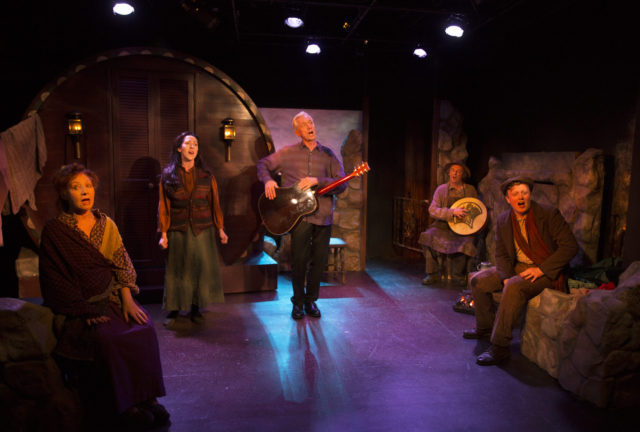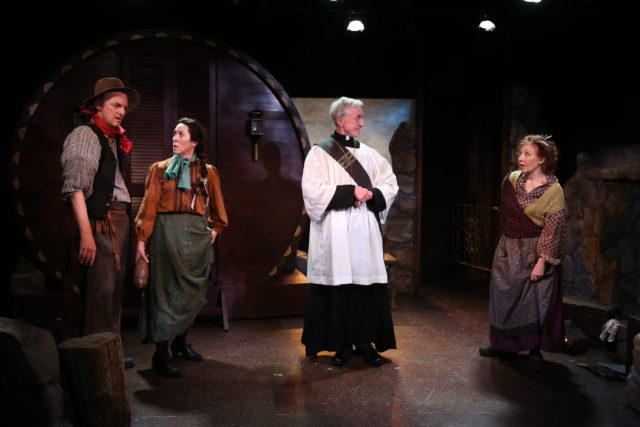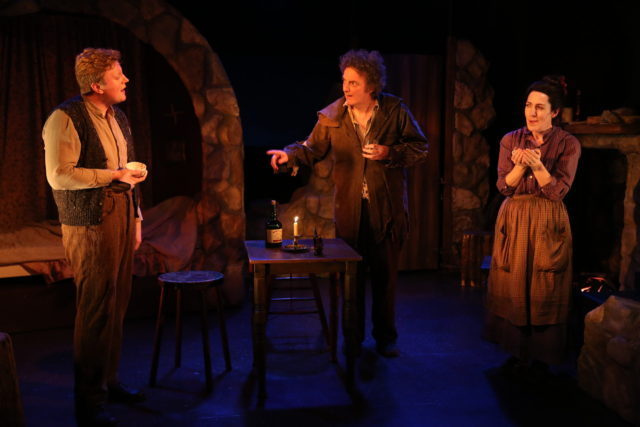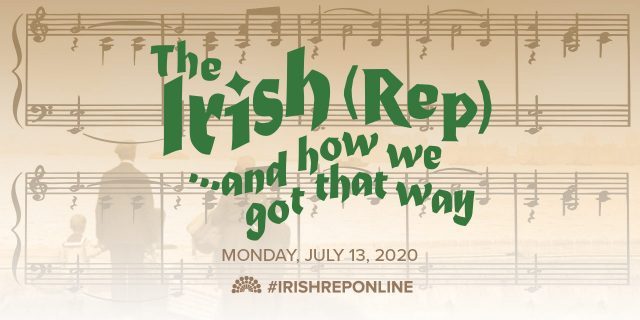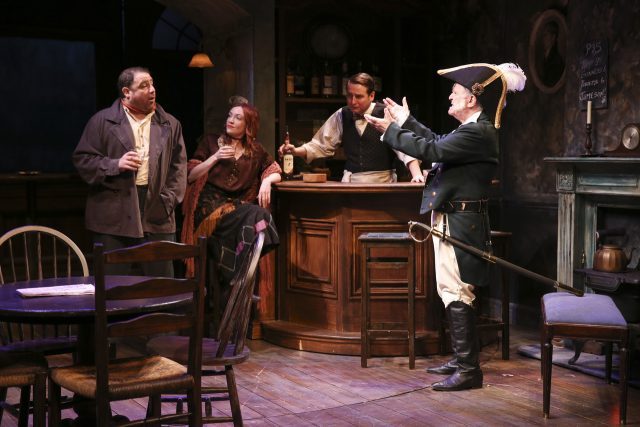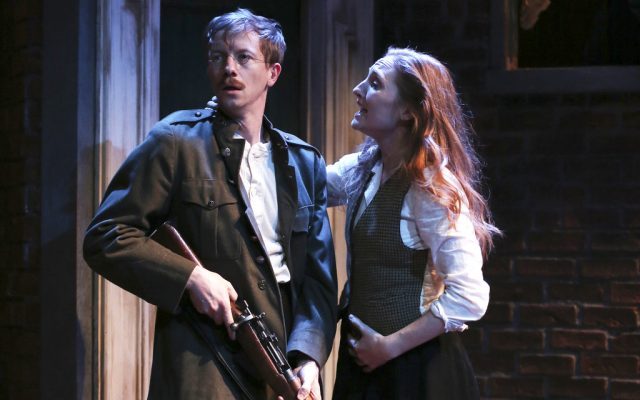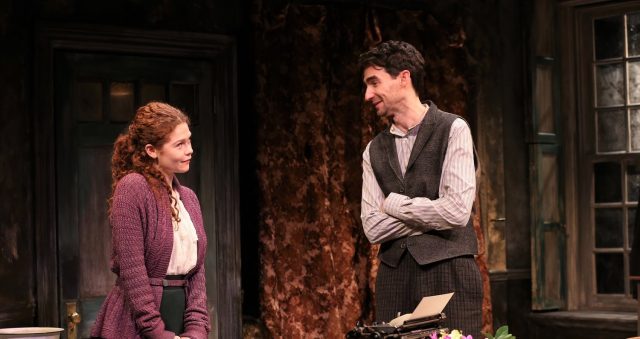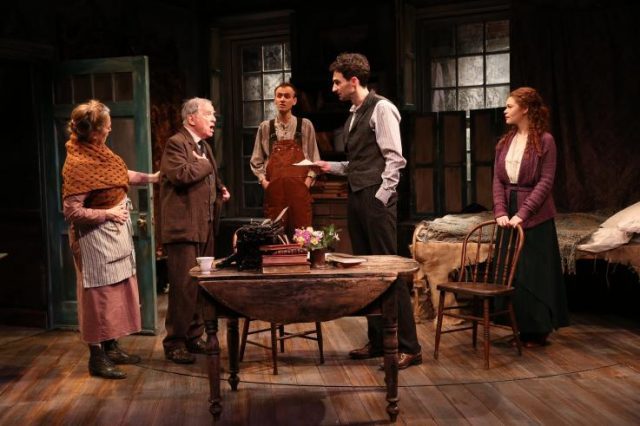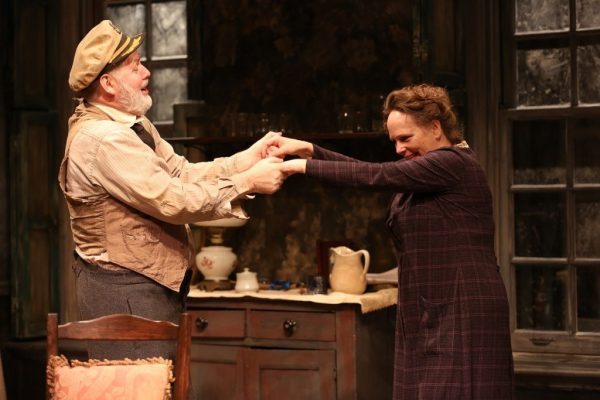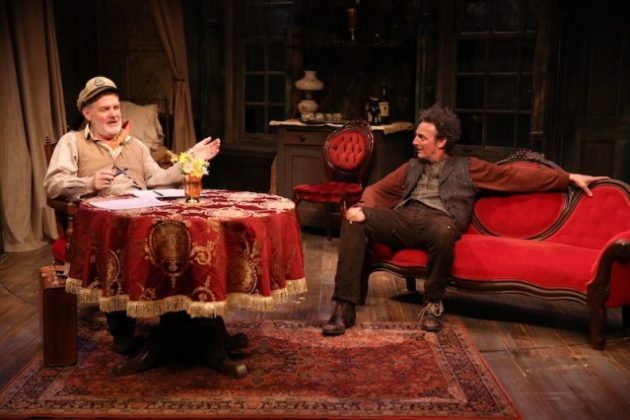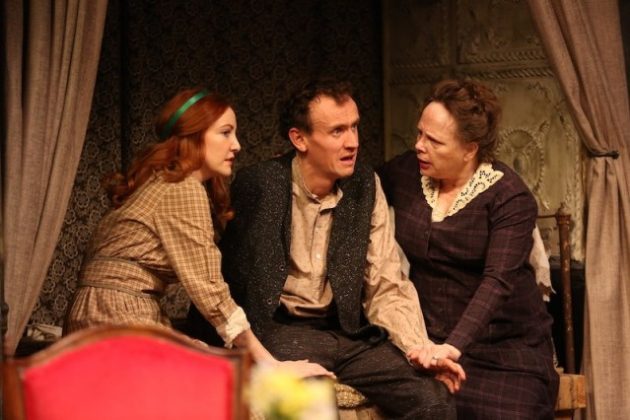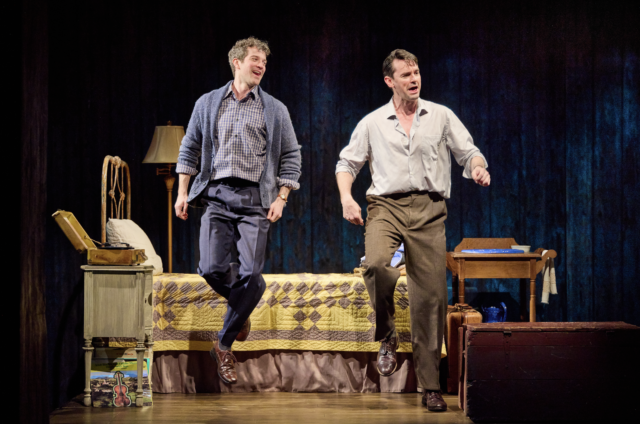
Gar is portrayed by two actors (A. J. Shively and David McElwee) in third Irish Rep adaptation of Brian Friel play (photo by Jeremy Daniel)
PHILADELPHIA, HERE I COME!
Irish Repertory Theatre, Francis J. Greenburger Mainstage
132 West Twenty-Second St. between Sixth & Seventh Aves.
Wednesday – Sunday through May 5, $60-$125
212-727-2737
irishrep.org
In January, I wrote that the Irish Rep’s second production in its Friel Project, Aristocrats, the follow-up to Translations, was another example of “what it does best, an exquisite revival of a superb Irish drama.” The same can be said for the third of its four-play celebration, an intimate and powerful staging of Irish dramatist Brian Friel’s 1964 international breakthrough, Philadelphia, Here I Come!
Previously presented by the company in 1990 and 2005, Philadelphia, Here I Come! takes place over the course of one night, as twenty-five-year-old Gareth Mary O’Donnell prepares to leave his hometown of Ballybeg in Ireland for a new life in America, moving in with his aunt Lizzy (Deirdre Madigan) and uncle Con (Ciaran Byrne) in Philadelphia. Gar, as he’s known, is ingeniously portrayed by two actors: David McElwee is the Public Gar, a tightly wound man incapable of speaking up for his wants and desires, described by Friel as “the Gar that people see, talk to, and talk about,” while A. J. Shively is the Private Gar, an exuberant soul aching to enjoy life’s endless pleasures, who the playwright calls “the unseen man, the man within, the conscience.” The two are side by side the entire two-hour play (plus intermission), singing and dancing, hovering behind other characters, and packing a ratty old suitcase that has to be sealed shut with rope.
Gar works for his father, S.B. (Ciarán O’Reilly), who Private Gar calls Screwballs, selling dry goods, hardware, dehydrated fish, and other disparate items. Both men are haunted by the death of Gar’s mother, Maire, who passed away three days after Gar was born. S.B. is dour and guarded, rarely saying anything of interest, barely even looking at Gar and their longtime housekeeper, Madge (Terry Donnelly). Dressed in black, as if in perpetual mourning, he sits at the small kitchen table drinking tea, reading the paper, and going back and forth between the house and the store to check on things, avoiding at all costs the topic of his son’s imminent departure.
“He’ll have something to say . . . you’ll see. And maybe he’ll slip you a couple of extra pounds,” Madge tells Gar, who responds, “Whether he says good-bye to me or not, or whether he slips me a few miserable quid or not, it’s a matter of total indifference to me, Madge.”
Meanwhile, Gar is trying to convince himself that he’s made the right choice, having previously been too frightened to ask his father for fair wages or to fight for the woman he loves, Katie Doogan (Clare O’Malley). He’s even unsure of just how close he really is with his drinking buddies, Tom (Tim Palmer), Ned (James Russell), and Joe (Emmet Earl Smith).
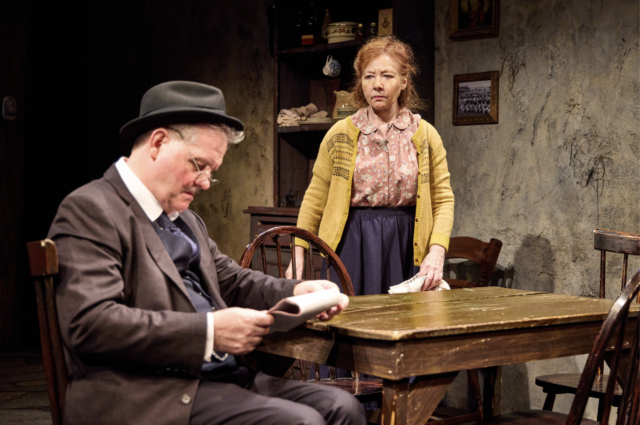
S. B. O’Donnell (Ciarán O’Reilly) doesn’t have much to say in Philadelphia, Here I Come! (photo by Jeremy Daniel)
Private Gar: You are full conscious of all the consequences of your decision?
Public Gar: Yessir.
Private: Of leaving the country of your birth, the land of the curlew and the snipe, the Aran sweater and the Irish Sweepstakes?
Public: I . . . I . . . I . . . I have considered all these, sir.
Private: Of going to a profane, irreligious, pagan country of gross materialism?
Public: I am fully sensitive to this, sir.
Private: Where the devil himself holds sway, and lust . . . abhorrent lust is everywhere indulged in shamelessly?
Public: Shamelessly, sir, shamelessly.
Private: And yet you persist in exposing yourself to these frightful dangers?
They are then interrupted by the sensible Madge, who chides, as if she can see and hear both of them, “Oh! You put the heart across me there! Will you quit eejiting about!”
But Gar can’t stop eejiting about as the hour of his emigration approaches.
Part of the Irish Rep’s thirty-fifth anniversary, Philadelphia, Here I Come! takes its name from the 1921 song “California, Here I Come,” in which Al Jolson, in the Broadway musical Bombo, declares, “California, I’ve been blue / Since I’ve been away from you . . . California, here I come / Right back where I started from.” California has always been the land of opportunity, where anyone has the possibility of striking it rich, from gold mining to Hollywood dreaming. Gar might be thinking the same thing about Philadelphia, but there’s an ominous undertone throughout that not only asks whether Gar will actually leave but wonders if he will eventually end up right back where he started from, as if his potential escape is doomed by the old baggage the Irish seem fated to carry.
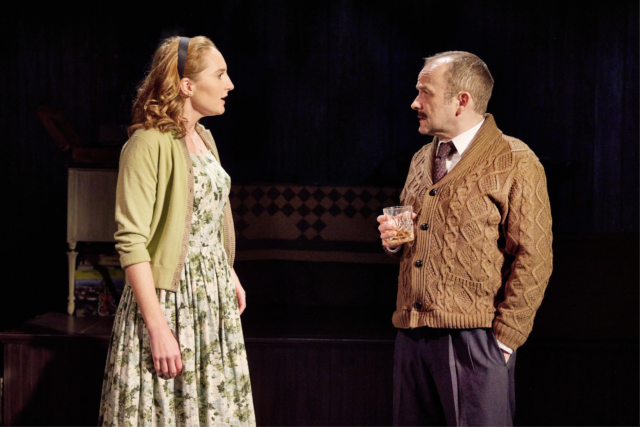
Katie Doogan (Clare O’Malley) discusses her prospects with her father, a senator (Ciaran Byrne), in Friel revival (photo by Jeremy Daniel)
Irish Rep founding producing director O’Reilly knows this play well, and it shows in this outstanding production. O’Reilly played Private Gar in the 1990 version and directed the 2005 revival; he helms the current iteration with a gentle grace, and he plays S.B. with a quiet loneliness. Like his son, S.B. is unable to share his thoughts, which he keeps bottled up; at one point, after Gar leaves the table, S.B. returns to reading his paper, but it is upside down, a hint that he cares more than he is letting on.
Shively (A Man of No Importance) and McElwee (A Man for All Seasons) are a dynamic duo as Gar, the former spirited and lively, flitting about the stage with boundless energy, just the right foil for the latter, who wants to break out in front of other people but just can’t. They bounce around between the kitchen table and the bedroom in the back, where Public Gar puts on scratchy Mendelssohn records. The comfy but cold set is by Charlie Corcoran, with effective costumes by Orla Long, soft lighting by Michael Gottlieb, and keen sound and original interstitial music by Ryan Rumery and M. Florian Staab.
Donnelly (Juno and the Paycock) gives a tender, poignant performance as Madge, a motherly matron who has sacrificed her personal life to take care of S.B. and Gar. The rest of the ensemble is in fine form, with Fitzgerald (Katie Roche), who played Public Gar opposite O’Reilly in 1990, quirky as professor and poet Master Boyle and Con; Madigan (Coal Country) is a whirlwind as Lizzy, who is desperate to have Gar join them in Philadelphia; O’Malley (The Plough and the Stars) is sweetly innocent as Katie, who is waiting for Gar to finally step up; and Byrne (A Touch of the Poet) excels as the proper Senator Doogan and the perhaps less-than-proper Canon O’Byrne.
Philadelphia, Here I Come! is a timeless, quintessentially Irish drama from one of the best playwrights the country has produced. At one point, Lizzy, speaking about S.B., proclaims to Gar, “Sure! Sure! Typical Irish! He will think about it! And while he’s thinking about it the store falls in about his head. What age are you? Twenty-four? Twenty-five? What are you waiting for? For S.B. to run away to sea? Until the weather gets better?”
Philadelphia! is a fitting third selection for this special Irish Rep season, which began with Translations, in which the Irish watched the British literally take their language away; continued in Aristocrats, as the title characters gradually receded into fantasy, their words less and less consonant with the reality around them; and proceeds with Philadelphia!, as Gar, choking on silence, prepares to leave the only home he’s ever known for a new life in America. The Friel Project concludes May 15 – June 30 with the three-character Molly Sweeney, in which a woman seeks to restore her eyesight.
[Mark Rifkin is a Brooklyn-born, Manhattan-based writer and editor; you can follow him on Substack here.]
